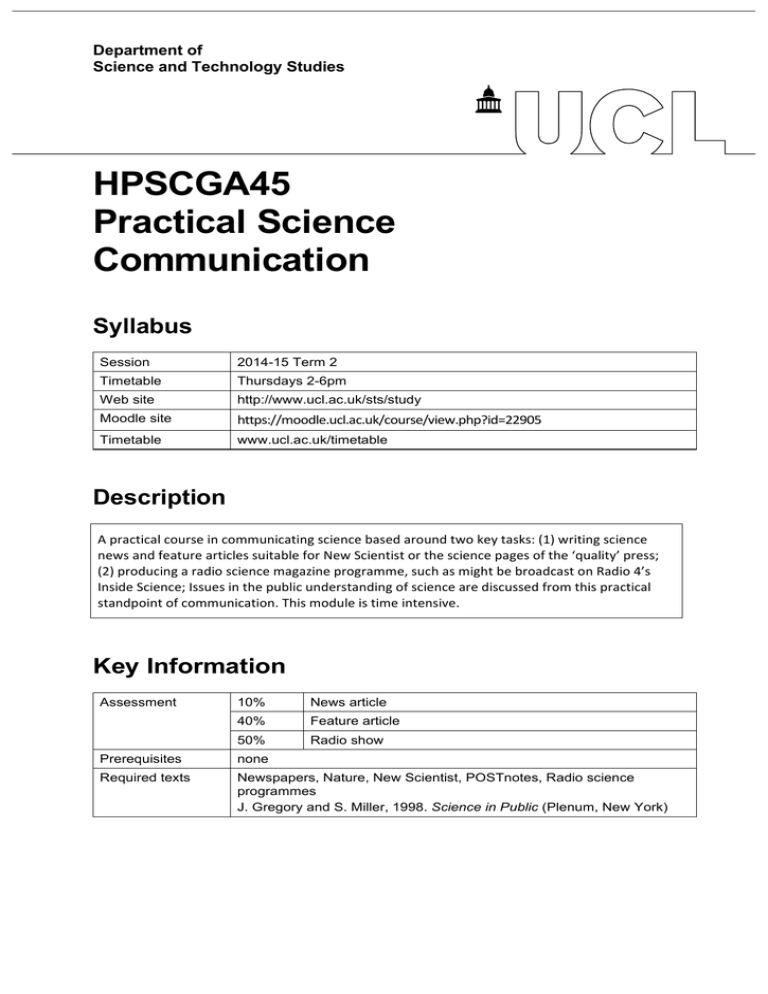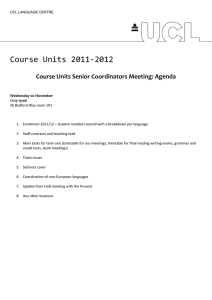HPSCGA45 Practical Science Communication Syllabus
advertisement

Department of Science and Technology Studies HPSCGA45 Practical Science Communication Syllabus Session 2014-15 Term 2 Timetable Thursdays 2-6pm Web site http://www.ucl.ac.uk/sts/study Moodle site https://moodle.ucl.ac.uk/course/view.php?id=22905 Timetable www.ucl.ac.uk/timetable Description A practical course in communicating science based around two key tasks: (1) writing science news and feature articles suitable for New Scientist or the science pages of the ‘quality’ press; (2) producing a radio science magazine programme, such as might be broadcast on Radio 4’s Inside Science; Issues in the public understanding of science are discussed from this practical standpoint of communication. This module is time intensive. Key Information Assessment 10% News article 40% Feature article 50% Radio show Prerequisites none Required texts Newspapers, Nature, New Scientist, POSTnotes, Radio science programmes J. Gregory and S. Miller, 1998. Science in Public (Plenum, New York) HPSCGA45 Practical Science Communication 2014-15 syllabus Module tutors Module tutor Professor Steve Miller Contact s.miller@ucl.ac.uk | t: 020 7679 3490 Web http://www.ucl.ac.uk/sts/staff/miller Office location 22 Gordon Square, Room Office hours: Mondays 9-10am, Thursdays 10am-12noon and by appointment Aims and objectives aims The aims and objectives of this course are to introduce students to various forms of communicating science to lay audiences. objectives By the end of this course students will be able to write news and feature articles, and interview for radio Module plan Students are expected to attend a series of weekly workshops, lasting 3 hours, with an additional hour of un-assessed study for some of the weeks. The first hour of each week will consist of a lecture, followed by practical exercises. The schedule for the additional un-assessed hour will be worked out after discussion with the course participants, based on what topics they have already covered in previous modules. Students can book face-to-face feedback sessions either by reserving slots in the advertised office hours or by making arrangements by email. Some of these sessions may have to be early morning or later in the evening, depending on demand. The set text for this course for the additional hours is Science in Public, and the references therein. Additional texts will be set as required. Students are expected to keep up to date with science in the news via whichever media suit them best. 2 HPSCGA45 Practical Science Communication 2014-15 syllabus Schedule UCL Wk Date Topic Activity 1 21 15-1-15 Making news out of science Introductory discussion 2 22 22-1-15 Interviewing Nature news writing 3 23 29-1-15 Writing your news articles Read newspapers 4 24 Feature writing Read New Scientist features 5 25 12-2-15 Mrs Kelly’s Monster Read Mrs Kelly’s Monster 26 19-2-15 Reading Week no lectures 6 27 26-2-15 Radio science Radio editorial board 7 28 Discussion of radio topics and feature article Interview contributors 8 29 12-3-15 Radio programme recording Interview contributors 9 30 19-3-15 Radio programme recording Interview contributors 10 31 26-3-15 Radio programme recording Draft radio programme due 5-2-15 5-3-15 3 HPSCGA45 Practical Science Communication 2014-15 syllabus Reading list Newspapers, Nature, New Scientist, POSTnotes, Radio science programmes Newspapers, Nature, New Scientist, POSTnotes, Radio science programmes. There are several books that give advice on effective science communication. My view is that the best of these, despite its age, is still Communicating Science: a handbook by Michael Shortland and Jane Gregory (Longman, 1991). Students who have not had the opportunity to do so in previous courses would be well advised to read Science in Public: communication, culture and credibility by Jane Gregory and Steve Miller (Plenum, 1998; Perseus, 2000). Assessment summary Description Deadline Word limit 10% News article 23:59hrs Friday, February 20, 2015 350-500 40% Feature article 23:59hrs, Monday, May 4, 2015 2000 50% Radio show 23:59hrs, Monday, May 4, 2015 25 minutes coursework All of the above assessments are coursework. The exact nature of each piece will be explained in the lecture part of the class, and practice in carrying out the requisite tasks will be in the remaining class time. Multiple drafts of all coursework are permitted up until the day of the deadline. Feedback will be prompt; expect a maximum 48-hour turn-around and shorter as deadlines approach. 4
